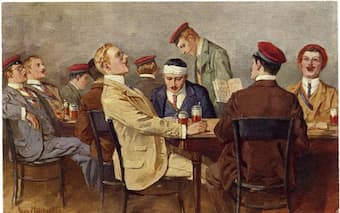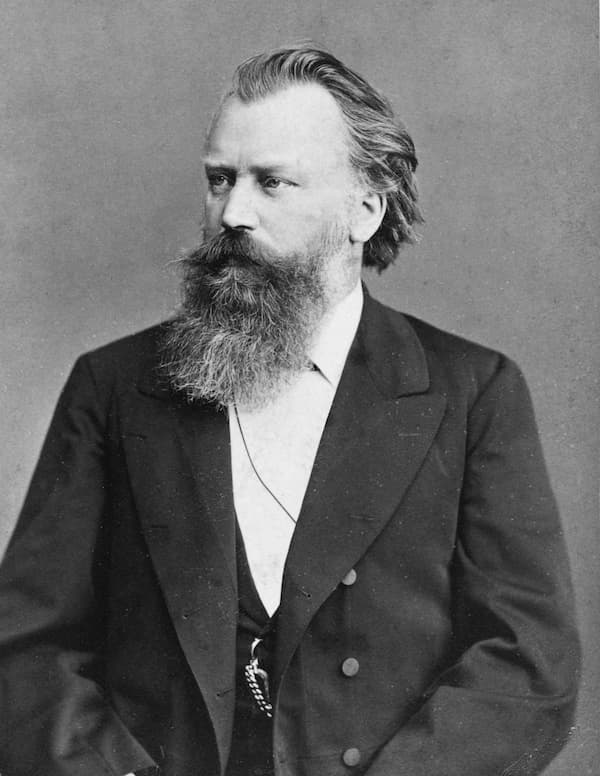The opening song in Franz Schubert’s song cycle Die schöne Müllerin is the lively and distinctive “Das Wandern” where our hero journey-man miller sings as he walks along a stream, appreciating all that he sees and hears.
It’s a simple strophic setting, with each verse set to the same music.
Franz Schubert: Die schöne Müllerin, Op. 25, D. 795: No. 1. Das Wandern (Peter Schreier, tenor; András Schiff, piano)
Das Wander | Wandering |
Das Wandern ist des Müllers Lust, | Wandering is the miller’s joy, |
Das Wandern! | Wandering! |
Das muß ein schlechter Müller sein, | He must be a miserable miller, |
Dem niemals fiel das Wandern ein, | Who never likes to wander. |
Das Wandern. | Wandering! |
|
|
Vom Wasser haben wir’s gelernt, | We’ve learned this from the water, |
Vom Wasser! | From the water! |
Das hat nicht Rast bei Tag und Nacht, | It does not rest by day or night, |
Ist stets auf Wanderschaft bedacht, | It’s always thinking of wandering, |
Das Wasser. | The water. |
|
|
Das sehn wir auch den Rädern ab, | We see this also with the wheels, |
Den Rädern! | With the wheels! |
Die gar nicht gerne stille stehn, | They don’t like to stand still, |
Die sich mein Tag nicht müde [drehn]1, | And turn all day without tiring. |
Die Räder. | With the wheels. |
|
|
Die Steine selbst, so schwer sie sind, | The stones themselves, heavy as they are, |
Die Steine! | The stones! |
Sie tanzen mit den muntern Reihn | They join in the cheerful dance, |
Und wollen gar noch schneller sein, | And want to go even faster. |
Die Steine. | The stones! |
|
|
O Wandern, Wandern, meine Lust, | Oh, wandering, wandering, my joy, |
O Wandern! | Oh, wandering! |
Herr Meister und Frau Meisterin, | Oh, Master and Mistress, |
Laßt mich in Frieden weiter ziehn | Let me go on in peace, |
Und wandern. | And wander! |

August Weger: Carl Friedrich Zöllner
We can also hear how the interpretation of the poem comes into this particular performance: when he gets to the section on the heavy stones, the momentum slows, and then slows again when he is thinking about begging the master miller and his wife to just let him wander.
Then, in the hands of Carl Friedrich Zöllner (1800-1860), we have a song more for the university singers. The clear emphasis on the elements (the water, the wheel, the stones) is lost and there’s more joy in just wandering. This isn’t the story of a journey man miller, but rather of a wandering group of students, singing as they travel.
Carl Friedrich Zöllner: Des Mullers Lust und Leid, Op. 6: No. 1. Das Wandern ist des Mullers Lust (Leipzig Radio Chorus, male section; Jörg-Peter Weigle, cond.)

Mühlberg: Cantus (1900) showing German students singing
Zöllner was a German choral composer and director. In the mid-19th century, when a male-chorus movement took over choral singing in Germany, Zöllner became a leading figure. He founded choirs all over Germany and by 1859, he was directing some 20 singing societies. His collection of six songs from Wilhelm Müller’s poem cycle Die schöne Müllerin was issued as his Op. 6, under the title of Des Müllers Lust und Leid (The Miller’s Happiness and Sorrow).
Finally, transformed into a traditional folk song, we have this version that sets the song in rather a heroic style.
This again can be connected to the mid-19th century male choral movement – this concert choral music, not wandering around the countryside singing music.
Listening to these three different settings of the same text, Schubert’s from 1823, Zöllner’s from 1844, and the ‘traditional’ one from probably a bit later, we can hear how different approaches can make us hear the poem differently. Whereas Schubert’s setting emphasizes the nouns: the water, the stones, etc., the other settings emphasize the act of wandering.
For more of the best in classical music, sign up to our E-Newsletter

